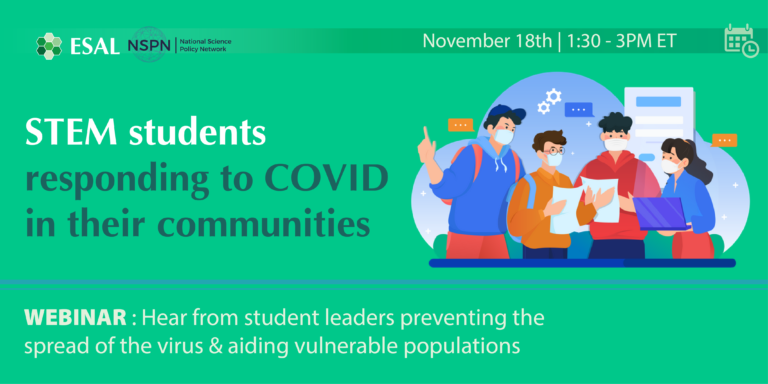
“Our expertise is science; their expertise is what they need.” This statement by panelist Elina Kostyanovskaya referred to the importance of listening to vulnerable communities. It was one of several key takeaways from the webinar “STEM Students Responding to COVID in their Communities,” which was jointly hosted by ESAL and the National Science Policy Network on November 18.
The webinar featured three students who have spearheaded efforts to tackle challenges arising from the pandemic, including Kostyanovskaya from the Science Policy Group at the University of California, San Francisco as well as Serena Wang from CovidSMS and Alexandria Lee from Students vs. Pandemics. The event kicked off with presentations by each speaker followed by a Q&A session moderated by ESAL volunteer Rebecca Mandt.
Wang, a 4th year public health major at Johns Hopkins University, sought to fill a critical communication gap. As co-founder of CovidSMS, she helped create a messaging platform that could reach low income and disadvantaged individuals, many of whom do not have a computer or internet access, but often do have a cell phone with texting capability. Local organizations and public agencies use their platform to deliver COVID-related information to subscribers in a specific zip code. In a live demo, Wang showed the ease of using CovidSMS to receive coronavirus data or access resources such as food or rental assistance. (Read more about CovidSMS in ESAL’s interview with Wang.)
Lee, a recent graduate of Harvard’s School of Public Health, started an organization called Students vs. Pandemics together with her sister, who was also a Harvard graduate student at the time. Lee saw the early confusion of the pandemic and realized that a “student-led ecosystem” would have the energy, diversity, and knowledge to help. So far, Students vs. Pandemics has amassed over 500 volunteers across the country. They’ve worked on a variety of projects, including blog posts to break down complex topics, PPE and blood donation drives, surveys of non-English speaking communities, policy memos, and more.
The third speaker was Kostyanovskaya, a biology PhD student at UCSF. She described their initiative, Project Clean Hands, and the subsequent journey of distributing hand sanitizer and informational pamphlets to incarcerated populations. Using their own research labs, the group manufactured hand sanitizer and delivered it to county jails and state prisons across California, often meeting resistance from corrections officials who were skeptical about allowing alcohol (in the form of sanitizer) on the premises. They had to source packaging materials, manage press and publicity, and fundraise on GoFundMe — ultimately distributing over 45,000 bottles of hand sanitizer.
Both Wang of CovidSMS and Lee of Students vs. Pandemics believe there will be a place for their respective platforms once the pandemic is over. Wang sees SMS communication as continuing to provide a lifeline for populations without internet access. Lee added, “there are plenty of social challenges left to address and students are such an incredible source of ideas and manpower.” Lee believes students will remain uniquely positioned to solve monumental issues and hopes her organization can transform into students versus “name your challenge.”
In a hard dose of reality, Kostyanovskaya acknowledged the bureaucratic obstacles of working with jails and prisons, which would disallow aid to incarcerated groups beyond the pandemic. She hopes that incarcerated individuals will not be forgotten once a vaccine is available, because they are especially susceptible to outbreaks. In the future, she hopes government institutions will work to meet their basic health needs.
A common thread in the success of all three speakers included their ability to: leverage the diverse skills of their academic peers; partner with established community groups; and pay special attention to the needs of disadvantaged populations. These strengths have become a signature of the student COVID-19 response.
When asked what advice they would give to other scientists, the student speakers encouraged a humanistic approach and advised scientists to get outside their bubble. “A lot of community and public health work is based upon building a relationship of respect, trust, and dignity,” explained Wang. Engaging with your community and local leaders now will make everyone better off in the next crisis.